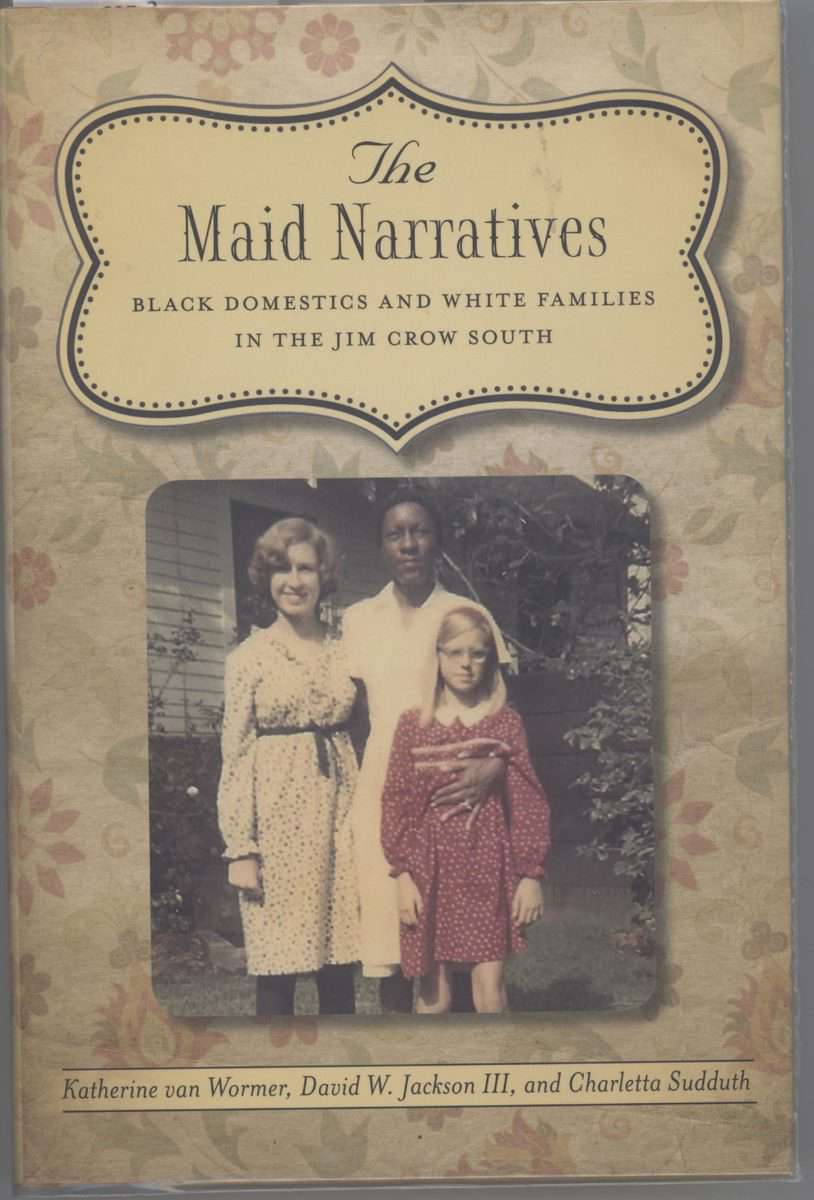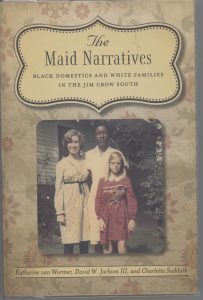This post by IWA Assistant Curator Janet Weaver and Graduate Research Assistant Heather Cooper is the second installment in our series highlighting African American history in the Iowa Women’s Archives’ collections. The series will continue weekly during Black History month, and monthly throughout 2020.
The Iowa Women’s Archives is honored to be the repository for a collection of oral history interviews recorded with southern African American women who worked as maids for white families and later migrated to Waterloo, Iowa. These women were interviewed for the 2012 book, The Maid Narratives: Black Domestic Workers and White Families in the Jim Crow South, written by Katherine van Wormer, David W. Jackson III, and Charletta Sudduth. The Maid Narratives collection at IWA includes nineteen of the original audio interviews (now digitized) and abridged transcripts of several of the interviews included in the book. In the oral histories, women engage with topics such as education, family, sharecropping, Jim Crow laws, sexual assault, and the civil rights movement.
Mamie Johnson was born outside Jackson, Mississippi in 1922 and spoke to David W. Jackson about growing up on a sharecropped farm and working for whites from a young age, just as her mother had. “I started working for white people when I was just big enough and old enough to do the dishes, and that was about seven or eight.” Speaking about the Tates, the first family she worked for, Johnson recalled having to learn and navigate the racial etiquette of the household.
You had to go to the back door. It was just a rule and you knowed it! And when the children got to be teenagers, it was Mister or Miss. When I’d be working in the house, they would show me what to say. They would tell me, ‘When you clean up Mr. David’s room, do this or fix his so-and-so, or don’t do so-and so.’ When they said, ‘Mister,’ that is for you to say it—‘Mister.’ And you know them little children and the teenagers—they loved it for you to say that! Yeah, they loved for you to say Mr. So-and-So. You know one thing, I was so glad when the time come around when black people would talk to white people to say what they thought. Now you talking about a shouting time, I felt just like shouting when black people stopped having to say Mr. So-and-So. And they would say it just for you to say it.
A keen observer of human behavior, Johnson also spoke about the terrible consequences of not understanding the social deference that was expected and demanded of African Americans in the South. She vividly remembered the details of Emmett Till’s murder and watching the trial unfold over three short weeks. “The boy just whistled at the woman, you know, didn’t know the danger he was in.” What she remembered most from the trial was the accused murderers “kissing their wives, hugging their wives, and rejoicing” when they were found not guilty. This stood in stark contrast to the image of Emmett Till, whose funeral service she also watched on TV. The interviews included in this collection are a testament to these women’s work, family ties, humor, and survival.
This March we will celebrate Women’s History Month by learning more about these remarkable women whose lives were shaped by domestic service in white households in the Jim Crow South. Recently described in a Time Magazine article as a “landmark collection of oral histories,” the interviews conducted by Charletta Sudduth and David Jackson III shine a light on the daily lives, struggles, and courage of the thousands of African American women who labored as domestic servants in the South but about whom relatively little is known.
Join us at the Iowa City Public Library on March 3 for a conversation with historians, social workers, and civil rights activists who are tied to this history:
- Annie Pearl Stevenson is a civil rights activist and former domestic worker who was interviewed for The Maid Narratives.
- Charletta Sudduth, Ed.D., is co-author of The Maid Narratives and Early Childhood Consultant with the Waterloo Community School District.
- David Jackson III, Ph.D., is co-author of The Maid Narratives and Adjunct Assistant Professor in the African American Studies Program at the University of Iowa.
- Katherine van Wormer is co-author of The Maid Narratives and Professor Emerita, Department of Social Work, University of Northern Iowa.
- Catherine Stewart, Professor, Department of History, Cornell College, is currently an Obermann Fellow-In-Residence, and working on a book, “The New Maid: African American Women and Domestic Service During the New Deal.”
What: Iowa Women of the Great Migration: The Maid Narratives
When: Tuesday, March 3, 4:00pm to 5:30pm (Reception at 3:30pm)
Where: Iowa City Public Library, Meeting Room A
Co-sponsors – Iowa City Public Library, Obermann Center for Advanced Studies (University of Iowa)

